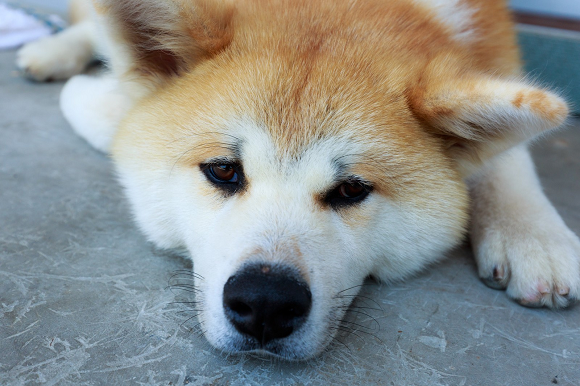
Alina Zagitova wants to give her new Akita Inu a name that means “victory,” but there’s one thing she might be overlooking.
Although Japan captured both the gold and silver medals in men’s figure skating at the PyeongChang Olympics, no Japanese women medaled in the event. There was still plenty of love for the country present on the women’s podium, though.
Not only did Russia’s Evgenia Medvedeva, a noted Sailor Moon fan, take home the silver medal in the ladies’ singles, her compatriot Alina Zagitova, the gold medalist, also has a soft spot for certain aspects of Japanese culture. As part of her training, Zagitova has spent time in Japan, where she became enamored with the Akita Inu breed of dog after seeing photos of them in magazines and a film about the life of Hachiko, the Akita Inu that became a famous symbol of loyalty with a statue in its honor outside of Shibuya Station in Tokyo.
▼ An Akita Inu
Following her gold medal-winning performance, the 15-year-old Zagitova told reporters that she’s wanted to have an Akita Inu of her own for some time, and that her mom told her she’d “think about getting one” for the family if her daughter did well at the Olympics. Since Zagitova did better than anyone else in the world, the way was paved for an Akita Inu to join her household, and when Japan’s Akita Inu Preservation Society animal welfare society heard about the skater’s canine ambition, they offered to send Zagitova an Akita Inu, an offer her family has accepted.
While the paperwork is still being processed, the society has picked out a pooch for Zagitova, and the skater has already picked out a name for her soon-to-be pet. In speaking with Russian reporters about the gift, Zagitova said “I’ve decided to name her Masaru. She’s a girl. In Japanese, ‘Masaru’ means ‘victory.’”
Zagitova is correct in that “Masaru,” when written with the kanji 勝, does indeed mean “victory,” which is a fitting name for the animal companion of a world champion. However, many would say it’s a less-fitting name for a female Akita Inu, since Masaru is traditionally a male name. What’s more, though Japanese has a handful of unisex names, Masaru is a decidedly old-school, masculine moniker, sort of like, say, “Harold” in English.
In her defense, Zagitova is an athlete, not a linguist, and her desire to give her new dog a name that represents both its country of origin and the circumstances upon which the animal has come into her life is quite sweet. If, though, she’d rather give her Akita Inu a Japanese woman’s name, Katsumi, written 勝美 and meaning “victory and beauty,” would be an elegant choice, especially since it’s the given name of Japanese volleyball player Katsumi Matsumura, who competed in the 1964 Olympics where she, just like Zagitova, won a gold medal.
Sources: Yahoo! News Japan/FNN via Hachima Kiko, Huffington Post Japan
Top image: Wikipedia/Luu
Insert images: Pakutaso


 Olympic figure skaters cosplay as game characters in new Magia Record commercial 【Video】
Olympic figure skaters cosplay as game characters in new Magia Record commercial 【Video】 Tour Akita Prefecture from the back of an Akita Inu Dog with Google’s adorable doggie Street View
Tour Akita Prefecture from the back of an Akita Inu Dog with Google’s adorable doggie Street View Older female fans’ steamy comments about gold medal skater Yuzuru Hanyu spark debate online
Older female fans’ steamy comments about gold medal skater Yuzuru Hanyu spark debate online Japan’s craziest burger chain takes menchi katsu to new extreme levels
Japan’s craziest burger chain takes menchi katsu to new extreme levels Tokyo street sweets: The must-snack treats of Nakano’s Refutei
Tokyo street sweets: The must-snack treats of Nakano’s Refutei The fish in rural Fukui that rivals Japan’s most auspicious sea bream
The fish in rural Fukui that rivals Japan’s most auspicious sea bream Family Mart ups its convenience store food game with special burger from beef bowl chain Matsuya
Family Mart ups its convenience store food game with special burger from beef bowl chain Matsuya Potama serves up epic rice balls like no other, and there’s only one store in Tokyo
Potama serves up epic rice balls like no other, and there’s only one store in Tokyo Japanese restaurant chain serves Dragon Ball donuts and Senzu Beans this spring
Japanese restaurant chain serves Dragon Ball donuts and Senzu Beans this spring Which convenience store onigiri rice balls are the most popular? Survey reveals surprising results
Which convenience store onigiri rice balls are the most popular? Survey reveals surprising results 7 hilarious/inexplicable Japan moments in South Park
7 hilarious/inexplicable Japan moments in South Park Mr. Sato remembers the hit song of 2020, it’s because of that $100 Dolce & Gabbana mask of his
Mr. Sato remembers the hit song of 2020, it’s because of that $100 Dolce & Gabbana mask of his Drift ice in Japan is a disappearing winter miracle you need to see now
Drift ice in Japan is a disappearing winter miracle you need to see now Starbucks Japan releases first-ever Hinamatsuri Girls’ Day Frappuccino
Starbucks Japan releases first-ever Hinamatsuri Girls’ Day Frappuccino Highest Starbucks in Japan set to open this spring in the Tokyo sky
Highest Starbucks in Japan set to open this spring in the Tokyo sky Tokyo Skytree turns pink for the cherry blossom season
Tokyo Skytree turns pink for the cherry blossom season Japan Extreme Budget Travel! A trip from Tokyo to Izumo for just 30,000 yen [Part 1]
Japan Extreme Budget Travel! A trip from Tokyo to Izumo for just 30,000 yen [Part 1] Yakuzen ramen restaurant in Tokyo is very different to a yakuza ramen restaurant
Yakuzen ramen restaurant in Tokyo is very different to a yakuza ramen restaurant Japan has only one airport named after a samurai, so let’s check out Kochi Ryoma【Photos】
Japan has only one airport named after a samurai, so let’s check out Kochi Ryoma【Photos】 Japanese drugstore sells onigiri at pre-stupid era prices, but how do they compare to 7-Eleven?
Japanese drugstore sells onigiri at pre-stupid era prices, but how do they compare to 7-Eleven? Japan Extreme Budget Travel! A trip from Tokyo to Izumo for just 30,000 yen [Part 2]
Japan Extreme Budget Travel! A trip from Tokyo to Izumo for just 30,000 yen [Part 2] Adorable Totoro acorn key holders come with a special guest hidden inside[Photos]
Adorable Totoro acorn key holders come with a special guest hidden inside[Photos] Japan’s newest Shinkansen has no seats…or passengers [Video]
Japan’s newest Shinkansen has no seats…or passengers [Video] Starbucks Japan releases new sakura goods and drinkware for cherry blossom season 2026
Starbucks Japan releases new sakura goods and drinkware for cherry blossom season 2026 Foreigners accounting for over 80 percent of off-course skiers needing rescue in Japan’s Hokkaido
Foreigners accounting for over 80 percent of off-course skiers needing rescue in Japan’s Hokkaido Super-salty pizza sends six kids to the hospital in Japan, linguistics blamed
Super-salty pizza sends six kids to the hospital in Japan, linguistics blamed Starbucks Japan unveils new sakura Frappuccino for cherry blossom season 2026
Starbucks Japan unveils new sakura Frappuccino for cherry blossom season 2026 Foreign tourists in Japan will get free Shinkansen tickets to promote regional tourism
Foreign tourists in Japan will get free Shinkansen tickets to promote regional tourism The 10 most annoying things foreign tourists do on Japanese trains, according to locals
The 10 most annoying things foreign tourists do on Japanese trains, according to locals Take a trip to Japan’s Dododo Land, the most irritating place on Earth
Take a trip to Japan’s Dododo Land, the most irritating place on Earth Naruto and Converse team up for new line of shinobi sneakers[Photos]
Naruto and Converse team up for new line of shinobi sneakers[Photos] Is China’s don’t-go-to-Japan warning affecting the lines at a popular Tokyo gyukatsu restaurant?
Is China’s don’t-go-to-Japan warning affecting the lines at a popular Tokyo gyukatsu restaurant? Survey asks foreign tourists what bothered them in Japan, more than half gave same answer
Survey asks foreign tourists what bothered them in Japan, more than half gave same answer Japan’s human washing machines will go on sale to general public, demos to be held in Tokyo
Japan’s human washing machines will go on sale to general public, demos to be held in Tokyo Starbucks Japan releases new drinkware and goods for Valentine’s Day
Starbucks Japan releases new drinkware and goods for Valentine’s Day We deeply regret going into this tunnel on our walk in the mountains of Japan
We deeply regret going into this tunnel on our walk in the mountains of Japan Studio Ghibli releases Kodama forest spirits from Princess Mononoke to light up your home
Studio Ghibli releases Kodama forest spirits from Princess Mononoke to light up your home Major Japanese hotel chain says reservations via overseas booking sites may not be valid
Major Japanese hotel chain says reservations via overseas booking sites may not be valid Put sesame oil in your coffee? Japanese maker says it’s the best way to start your day【Taste test】
Put sesame oil in your coffee? Japanese maker says it’s the best way to start your day【Taste test】 No more using real katana for tourism activities, Japan’s National Police Agency says
No more using real katana for tourism activities, Japan’s National Police Agency says